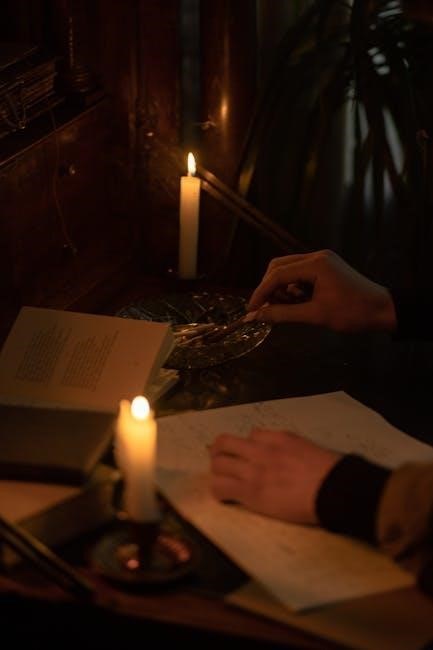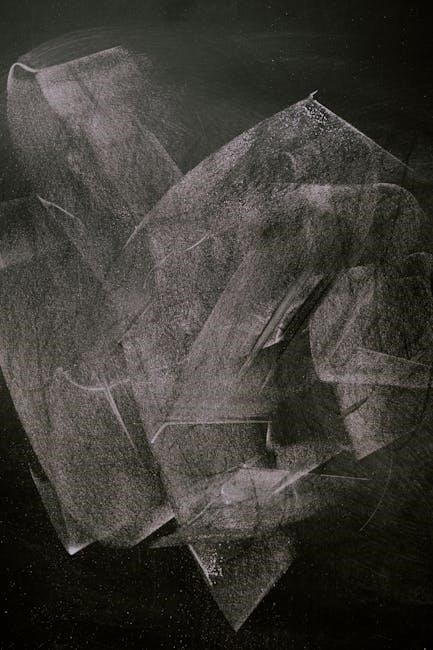Night by Elie Wiesel is a poignant memoir recounting his harrowing experiences during the Holocaust, exploring themes of faith, survival, and humanity․ It serves as a crucial educational tool for understanding the atrocities of World War II and the profound emotional and spiritual struggles faced by victims․ This study guide provides a comprehensive analysis of the book, helping readers delve into its historical context, themes, and literary significance․
1․1 Overview of the Memoir
Night by Elie Wiesel is a memoir recounting Eliezer’s harrowing journey through Auschwitz, Gleiwitz, and Buchenwald․ It explores themes of faith, survival, and the loss of innocence amidst the Holocaust’s horrors․ The narrative captures the psychological and emotional struggles, offering a profound reflection on humanity’s darkest hour․
1․2 Importance of the Study Guide
This study guide is essential for understanding Night, offering insights into themes, characters, and historical context․ It aids students in analyzing Wiesel’s narrative, fostering critical thinking and emotional engagement․ The guide includes summaries, analysis, and questions, making it a valuable resource for Holocaust education and literary study․
Historical Context
The Holocaust, a systematic persecution of Jews by the Nazis, forms the backdrop of Night․ Elie Wiesel’s memoir reflects his experiences in Auschwitz, Gleiwitz, and Buchenwald during WWII․
2․1 Background of the Holocaust
The Holocaust was a systematic persecution and extermination of Jews by the Nazis during World War II․ It involved mass deportations, concentration camps, and the brutal murder of six million Jews․ Key events included the Nuremberg Laws, Kristallnacht, and the Final Solution․ Auschwitz, where Elie Wiesel was imprisoned, became a symbol of the horrors․ Survivors like Wiesel faced unimaginable suffering, losing faith and humanity․
2․2 Elie Wiesel’s Personal Experience
Elie Wiesel, a young Orthodox Jew from Hungary, was deported to Auschwitz with his family in 1944․ He endured unimaginable suffering, witnessing the death of his mother and sister․ His father later died in Buchenwald․ Wiesel’s experiences shattered his faith in God and humanity, themes reflected in Night․ His survival and subsequent advocacy became a powerful voice for Holocaust remembrance and human rights․
Plot Summary
Night recounts Eliezer’s harrowing experiences during the Holocaust, from his deportation to Auschwitz to his struggles in concentration camps․ The memoir captures his emotional turmoil, loss of faith, and the brutal realities of survival amidst unimaginable horrors․ It traces his journey from innocence to despair, highlighting the dehumanizing effects of the Holocaust․
3․1 Early Life and Deportation
Eliezer, a devout Jewish teenager, grows up in Sighet, Hungary, studying Torah and Talmud․ His father, a community leader, dismisses warnings of Jewish persecution․ In 1944, Nazis occupy Hungary, and Eliezer’s family is deported to Auschwitz․ The journey is brutal, and upon arrival, Eliezer and his father are separated from his mother and sisters, marking the beginning of unimaginable suffering and loss of innocence․
3․2 Life in Auschwitz
Upon arrival at Auschwitz, Eliezer and his father endure inhumane conditions․ They are forced into labor, subjected to starvation, and witness constant brutality․ The camp’s harsh environment erodes hope and humanity, as prisoners struggle to survive․ Eliezer’s faith is tested as he observes the cruelty of the guards and the moral decay among prisoners, leading to a profound crisis of belief in a just God․
3․4 The Death March and Liberation
As Allied forces approach, prisoners are forced into a brutal death march to Gleiwitz․ Eliezer and his father face extreme cold, hunger, and exhaustion․ Many perish, but Eliezer finds the strength to keep moving․ Eventually, they are liberated by American soldiers, marking the end of their ordeal․ The liberation brings mixed emotions, relief, and a daunting reality of rebuilding shattered lives․

Major Themes
Night explores profound themes such as faith, survival, morality, and silence, reflecting Eliezer’s struggle with belief amidst unimaginable suffering and the dehumanizing effects of the Holocaust․
4․1 Faith and Spirituality
Faith and spirituality are central to Night, as Eliezer grapples with his belief in God amidst the Holocaust’s horrors․ The novel portrays his spiritual journey from devout adherence to questioning divine justice, highlighting the struggle to maintain faith in the face of unimaginable suffering and moral darkness․
4․2 Survival and Morality
Survival and morality in Night depict the harsh choices faced by Eliezer and his father in Auschwitz․ The struggle to stay alive often clashed with moral principles, revealing the depths of human resilience and the erosion of ethical norms under extreme duress, profoundly impacting Eliezer’s view of humanity and survival instincts․
4․3 Silence and the Significance of Night
The title Night symbolizes the darkness of the Holocaust, both literal and metaphorical, representing the void of hope and silence․ Eliezer’s journey is marked by the silence of God, the world’s indifference, and the stillness of death, emphasizing the profound impact of such silence on the human spirit and faith․ It encapsulates the unimaginable horrors witnessed․

Main Characters
Eliezer, the protagonist, narrates his Holocaust experiences․ His father, a community leader, struggles to protect him․ Moishe the Beadle, a wise mentor, foresees the horrors, influencing Eliezer’s journey․
5․1 Eliezer (Elie)
Eliezer, a devout Jewish teenager, is forcibly deported to Auschwitz, enduring unimaginable suffering․ His faith falters as he witnesses atrocities, questioning God’s presence․ His bond with his father is a focal point, illustrating resilience and the moral dilemmas of survival․ His journey symbolizes the loss of innocence and the struggle to maintain humanity amidst horror․
5․2 Elie’s Father

Elie’s father, a quiet, wise man, struggles to protect his son amidst the Holocaust’s brutality․ His deteriorating health and eventual death in Buchenwald symbolize the collapse of moral order․ Their bond highlights themes of sacrifice, love, and the ethical dilemmas faced in extreme conditions, deeply impacting Elie’s spiritual and emotional journey․
5․3 Moishe the Beadle
Moishe the Beadle, a kind, devout servant at the synagogue, is Elie’s mentor in Jewish mysticism․ His warnings about the Nazis’ atrocities are ignored, symbolizing the community’s disbelief․ After escaping Auschwitz, Moishe returns a broken man, his faith shattered, embodying the Holocaust’s impact on religious and spiritual beliefs, and foreshadowing the horrors Elie will face․
Symbolism in the Book
Night is rich in symbolism, with darkness representing the extinguished hope and faith of Holocaust victims․ It underscores the dehumanizing horrors and the moral darkness of the era․
6․1 The Night as a Symbol
Night symbolizes death, loss of hope, and spiritual darkness․ It represents the Holocaust’s dehumanizing horrors and the victims’ shattered faith․ Eliezer’s journey mirrors the darkness, as he struggles with God’s silence․ Night embodies the moral and spiritual void of the Holocaust, reflecting the extinguished light of humanity and the enduring trauma of its survivors․
6․2 Fire and Ash
Fire and ash are potent symbols in Night, representing destruction, suffering, and the annihilation of innocence․ The crematorium fires at Auschwitz burn bodies, mirroring the moral decay of humanity․ Ash embodies the remnants of lives lost, a haunting reminder of the Holocaust’s unimaginable atrocities and the irreversible loss of hope and faith in a broken world․
6․3 Silence
Silence in Night symbolizes the spiritual void and absence of divine justice․ It reflects the inability to comprehend the Holocaust’s horrors and the moral failure of humanity․ Wiesel uses silence to convey the suffocating despair and the loss of faith, emphasizing the profound impact of the Holocaust on individuals and humanity’s collective conscience․

Study Questions
This section provides a variety of questions to deepen understanding of Night․ Multiple-choice questions test basic comprehension, while short answers and essay prompts encourage critical analysis of themes, characters, and historical context․
7․1 Multiple-Choice Questions
These questions assess understanding of key events, themes, and character motivations in Night․ They cover the Holocaust’s historical context, Eliezer’s emotional journey, and the symbolism of night․ Students are asked to identify significant plot points, analyze themes like faith and survival, and recognize literary devices used by Wiesel․ Answers are provided to reinforce learning and comprehension of the memoir’s core elements․
7;2 Short Answer Questions
These questions require concise yet detailed responses, focusing on specific aspects of Night․ Students analyze Eliezer’s relationships, the role of faith, and the psychological impact of the Holocaust․ They also explore themes like morality and survival, encouraging critical thinking and deeper understanding of Wiesel’s experiences and the broader historical context of the Holocaust․

7․3 Essay Prompts
Essay prompts in this study guide invite students to explore themes such as faith, morality, and survival in Night․ They analyze the significance of silence, the impact of concentration camps on humanity, and Wiesel’s journey from belief to disillusionment․ These prompts encourage in-depth analysis and reflection on the Holocaust’s profound ethical and existential questions․

Literary Devices
Elie Wiesel employs vivid imagery and a haunting tone to convey the horrors of the Holocaust, while foreshadowing underscores the inevitability of the atrocities, intensifying the narrative’s emotional impact;
8․1 Foreshadowing
Foreshadowing in Night heightens tension and dread, as Wiesel subtly hints at the impending horrors․ For instance, Moishe the Beadle’s warnings and the increasing Nazi presence foreshadow the family’s deportation, creating a sense of inevitability that underscores the tragedy․ This literary device prepares readers for the unimaginable atrocities, making the narrative deeply unsettling and thought-provoking․
8․2 Imagery and Tone
Wiesel employs vivid imagery to depict the horrors of the Holocaust, creating a tone of somber reflection and existential despair․ The darkness of “night” symbolizes the moral and spiritual void, while graphic descriptions of suffering evoke a haunting reality․ The tone shifts from hopeful to despairing, mirroring Eliezer’s internal conflict and loss of faith, leaving readers with a profound sense of tragedy․

Significance of the Book
Night by Elie Wiesel is a powerful Holocaust memoir, offering a personal perspective on survival, faith, and humanity․ It educates on atrocities, promoting tolerance and reflection․
9․1 Impact on Holocaust Education
Night serves as a primary educational resource for Holocaust studies, offering a personal, poignant narrative of survival․ Its raw depiction of atrocities fosters empathy and understanding, making it a cornerstone in teaching historical context, moral lessons, and humanity․ The memoir aligns with educational standards, encouraging critical reflection and dialogue about tolerance, remembrance, and the prevention of future genocides․
9․2 Why Night is Taught in Schools
Night is widely taught in schools for its vivid portrayal of the Holocaust, fostering empathy and understanding․ It aligns with educational goals by promoting critical thinking about morality, faith, and humanity․ The memoir’s personal narrative engages students emotionally, providing a deeper connection to history and encouraging reflection on tolerance and the importance of remembrance․ Its themes are essential for developing compassionate and informed global citizens․
Elie Wiesel’s Night is a powerful memoir that explores themes of faith, survival, and humanity․ Its impact on Holocaust education and remembrance remains unparalleled, fostering reflection and understanding of one of history’s darkest chapters․
10․1 Summary of Key Points
Night by Elie Wiesel is a memoir detailing his Holocaust experiences, exploring themes of faith, survival, and humanity․ The study guide highlights the novel’s historical context, its emotional depth, and its educational significance․ It underscores Wiesel’s journey from devotion to spiritual questioning, offering insights into morality, hope, and the atrocities of World War II, making it a vital resource for understanding this tragic period․

10․2 Final Reflection
Night leaves readers with a profound reflection on humanity, faith, and survival․ Elie Wiesel’s memoir underscores the horrors of the Holocaust, the struggle to maintain hope, and the enduring question of God’s silence․ It serves as a powerful reminder of the importance of remembering history to foster empathy, understanding, and the pursuit of justice and peace in a fractured world․



































